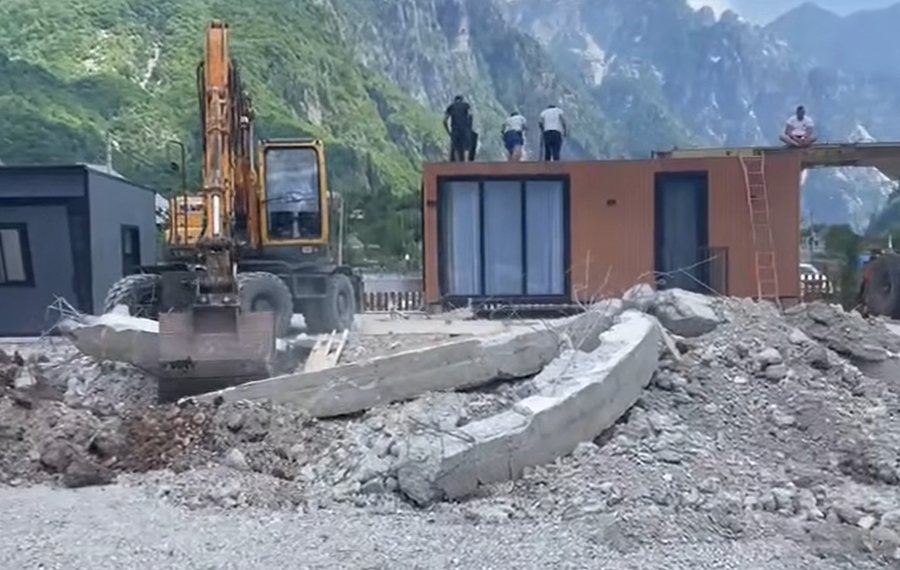Illegal cabins in heart of Theth spark clash between Prime Minister and Shkodra prosecution

Authorities have begun demolishing a group of illegal wooden cabins erected in the heart of Theth, Albania’s most iconic mountain village. The makeshift resort—ten cabins and two additional structures—was built without permits on a concrete platform directly adjacent to the village’s historic church, drawing sharp criticism from both the public and Prime Minister Edi Rama, who called it a “flagrant environmental crime.”
Why is this important: The incident has led to many questions being asked over how the project could have progressed so far without intervention. The cabins were visible, installed on concrete foundations, in the heart of a protected area—raising doubts about the vigilance and resolve of local authorities and the territorial inspectorate. Critics say the fact that it took national-level intervention to remove the structures points to deep dysfunction in how local governance enforces environmental and construction laws. But the scandal has also exposed divisions between Albania’s executive and judicial institutions. Prime Minister Rama has accused Shkodër’s Prosecution Office—and specifically prosecutor Elsa Gjeli—of enabling a crime against the public interest by refusing to open an investigation, despite a formal complaint from local police. “How is it possible,” Rama asked, “that after the police and inspectorate documented the violation and referred the case, the prosecution chose to bury it?”
Context: The square before the church, with its sweeping views of the Albanian Alps, is often described as the postcard of Theth, while Theth itself is the undoubtedly the crown jewel of Albania’s mountain tourism. It holds the same symbolic value for Albania’s tourism identity as Piazza San Marco does for Venice or Montmartre for Paris. The intrusion of unauthorized construction into this landscape has shocked many Albanians and ignited a national debate about accountability and the rule of law.
Officially, the property is registered to a local elderly landowner from Theth who claims to have borrowed money to install the cabins. However, several media outlets have reported, citing police sources, that the operation was allegedly financed and managed by Prek Kodra, a notorious fugitive with ties to organized crime. Kodra has been named in multiple criminal investigations, including a 2024 SPAK operation targeting a transnational criminal group, and was previously accused of plotting an attack on Kosovo Prime Minister Albin Kurti in a secret police memo in 2022.
The discrepancy between the official registration and the alleged real owner has raised further concern. While these reports remain unofficial, the emerging picture has shifted the stakes of the case—from a construction code violation to potential organized crime infiltration in one of Albania’s most treasured heritage sites.
Prosecutorial response: The Shkodër Prosecutor’s Office has defended its initial decision not to open a case, stating that the structures did not meet the legal definition of a “building” under Albanian law. In its official statement, it said the cabins were classified by police as “temporary containers without foundations” placed on stone slabs rather than concrete bases, and therefore did not require a construction permit.
However, critics note that this conclusion was reached without any serious investigation. While the prosecutor’s legal reasoning may align with narrow statutory definitions, the office is now facing renewed scrutiny for failing to act in light of the growing body of evidence, the public outcry, and allegations of criminal involvement. There are also concerns that the office relied too heavily on the initial police classification without verifying the extent of the construction or its permanence, despite the sensitivity of the locality where they were established.
Political fallout: While Prime Minister Rama has framed the demolitions as part of a broader campaign against illegal development, reactions from DP representatives have clearly denounced the government intervention. Thus, Democratic Party MP Gazment Bardhi, head of the DP Parliamentary Group, criticized the government for “harassing” locals and tourism investors. In a public statement, Bardhi surprisingly appeared to support the illegal construction, calling for the demolitions to stop.
The episode has revived an old political fault line. For decades, Albania’s Democratic Party was accused of tolerating or encouraging informal construction and land grabs in exchange for political support. These practices led to chaotic urban development, deep legal disputes and social tensions over land ownership, and the erosion of natural and public spaces. Rama, by contrast, first rose to political prominence as mayor of Tirana by removing thousands of illegal buildings from public squares and sidewalks.
This latest case in Theth reinforces the perception that the opposition lacks a new model for engaging voters and continues to rely on outdated tactics that contributed to its fall from power in 2013.
What’s next: The illegal cabins have now been cleared, and Rama has pledged that the state will take control of the area and restore the site. The Ministry of Justice is expected to formally refer prosecutor Elsa Gjeli’s handling of the case to the High Prosecutorial Council (KLP) for review.
Still, the case raises urgent questions about the effectiveness of Albania’s environmental protections and the willingness of local and judicial institutions to confront abuses—especially when they involve actors with criminal histories. As Albania deepens its push toward EU integration, the situation in Theth may prove a defining test of its readiness to uphold the rule of law, even in its most sacred landscapes.


